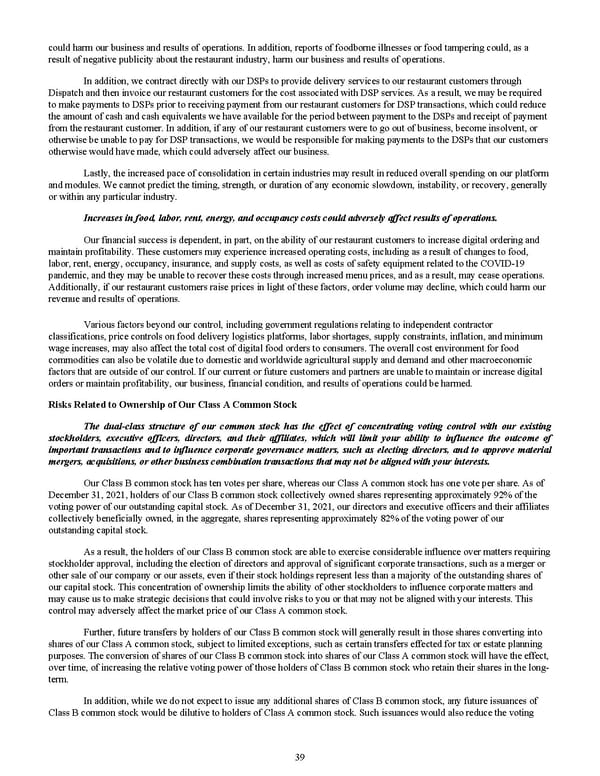could harm our business and results of operations. In addition, reports of foodborne illnesses or food tampering could, as a result of negative publicity about the restaurant industry, harm our business and results of operations. In addition, we contract directly with our DSPs to provide delivery services to our restaurant customers through Dispatch and then invoice our restaurant customers for the cost associated with DSP services. As a result, we may be required to make payments to DSPs prior to receiving payment from our restaurant customers for DSP transactions, which could reduce the amount of cash and cash equivalents we have available for the period between payment to the DSPs and receipt of payment from the restaurant customer. In addition, if any of our restaurant customers were to go out of business, become insolvent, or otherwise be unable to pay for DSP transactions, we would be responsible for making payments to the DSPs that our customers otherwise would have made, which could adversely affect our business. Lastly, the increased pace of consolidation in certain industries may result in reduced overall spending on our platform and modules. We cannot predict the timing, strength, or duration of any economic slowdown, instability, or recovery, generally or within any particular industry. Increases in food, labor, rent, energy, and occupancy costs could adversely affect results of operations. Our financial success is dependent, in part, on the ability of our restaurant customers to increase digital ordering and maintain profitability. These customers may experience increased operating costs, including as a result of changes to food, labor, rent, energy, occupancy, insurance, and supply costs, as well as costs of safety equipment related to the COVID-19 pandemic, and they may be unable to recover these costs through increased menu prices, and as a result, may cease operations. Additionally, if our restaurant customers raise prices in light of these factors, order volume may decline, which could harm our revenue and results of operations. Various factors beyond our control, including government regulations relating to independent contractor classifications, price controls on food delivery logistics platforms, labor shortages, supply constraints, inflation, and minimum wage increases, may also affect the total cost of digital food orders to consumers. The overall cost environment for food commodities can also be volatile due to domestic and worldwide agricultural supply and demand and other macroeconomic factors that are outside of our control. If our current or future customers and partners are unable to maintain or increase digital orders or maintain profitability, our business, financial condition, and results of operations could be harmed. Risks Related to Ownership of Our Class A Common Stock The dual-class structure of our common stock has the effect of concentrating voting control with our existing stockholders, executive officers, directors, and their affiliates, which will limit your ability to influence the outcome of important transactions and to influence corporate governance matters, such as electing directors, and to approve material mergers, acquisitions, or other business combination transactions that may not be aligned with your interests. Our Class B common stock has ten votes per share, whereas our Class A common stock has one vote per share. As of December 31, 2021, holders of our Class B common stock collectively owned shares representing approximately 92% of the voting power of our outstanding capital stock. As of December 31, 2021, our directors and executive officers and their affiliates collectively beneficially owned, in the aggregate, shares representing approximately 82% of the voting power of our outstanding capital stock. As a result, the holders of our Class B common stock are able to exercise considerable influence over matters requiring stockholder approval, including the election of directors and approval of significant corporate transactions, such as a merger or other sale of our company or our assets, even if their stock holdings represent less than a majority of the outstanding shares of our capital stock. This concentration of ownership limits the ability of other stockholders to influence corporate matters and may cause us to make strategic decisions that could involve risks to you or that may not be aligned with your interests. This control may adversely affect the market price of our Class A common stock. Further, future transfers by holders of our Class B common stock will generally result in those shares converting into shares of our Class A common stock, subject to limited exceptions, such as certain transfers effected for tax or estate planning purposes. The conversion of shares of our Class B common stock into shares of our Class A common stock will have the effect, over time, of increasing the relative voting power of those holders of Class B common stock who retain their shares in the long- term. In addition, while we do not expect to issue any additional shares of Class B common stock, any future issuances of Class B common stock would be dilutive to holders of Class A common stock. Such issuances would also reduce the voting 39
 2022 10K Page 45 Page 47
2022 10K Page 45 Page 47